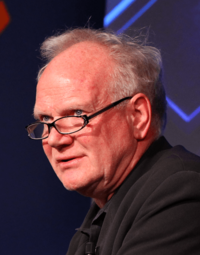Ulrich Beck facts for kids
Quick facts for kids
Ulrich Beck
|
|
|---|---|

Beck in 2012
|
|
| Born | 15 May 1944 |
| Died | 1 January 2015 (aged 70) Munich, Germany
|
| Nationality | German |
| Occupation | Sociologist |
Ulrich Beck (born May 15, 1944 – died January 1, 2015) was a famous German sociologist. A sociologist studies how people live together in groups and societies. Beck was one of the most talked-about social scientists in the world during his life.
His work looked at big questions about things we can't control, like when we don't know enough about something, or when things are uncertain in the modern world. He created the ideas of "risk society" and "second modernity". He also wanted people to think beyond their own countries. He believed the world is very connected, a concept called cosmopolitanism. He taught at the University of Munich and other places like the London School of Economics.
Contents
His Life and Work
Ulrich Beck was born in 1944 in a town called Stolp in Germany. This town is now Słupsk in Poland. He grew up in Hanover, another German city.
He first studied law at the University of Freiburg. But from 1966, he changed his focus to sociology, philosophy, psychology, and political science at the University of Munich. He earned his doctorate degree in 1972 and started working as a sociologist in Munich.
Later, he became a professor at different universities. From 1992 until he passed away, he was a sociology professor at the University of Munich. He received many awards from around the world for his important work.
Beck was very active in discussing big issues in Germany and globally. He often spoke about the European Union, climate change, and nuclear energy. He was working on a big research project about "Methodological Cosmopolitanism" when he died. This project looked at how climate change connects people across the world.
He was married to another social scientist, Elisabeth Beck-Gernsheim. Ulrich Beck passed away on January 1, 2015, at the age of 70.
Big Ideas: Risk Society
For 25 years, Ulrich Beck explored how people could think and act in a world that was changing fast. He looked at problems like environmental damage, money problems, and how democracy and countries were changing. He believed that modern society was changing so much that it was affecting its own basic ideas.
Beck studied how societies become modern, environmental issues, how people become more independent (individualization), and how the world becomes more connected (globalization). He also looked at how work was changing as the world became more global.
He created several new terms that are now used in sociology. Two of his most famous ideas are "risk society" and "second modernity".
What is a Risk Society?
The idea of a "risk society" was developed by Ulrich Beck and Anthony Giddens in the 1980s. They believed that the old ways of society, like different social classes, were breaking down. Instead, globalization was creating new risks that affect everyone, no matter how rich or poor they are.
For example, problems like radioactivity, pollution, or even losing your job can affect people from all walks of life. Richer families might try to protect themselves from some risks, but they can't avoid global problems like climate change. Poorer people often suffer more from these risks.
Beck also pointed out that how we see risks can be shaped by society. For instance, some risks, like terrorism, might seem more dangerous because they are talked about a lot in the news. This focus on risks can sometimes lead to judging things too quickly.
Awards and Recognition
Ulrich Beck received many important awards for his contributions to sociology:
- 1996: City of Munich Cultural Prize of Honour
- 1999: German-British Forum Award (with Anthony Giddens)
- 2005: Schader Prize, which is a very important award for social scientists in Germany.
- 2014: Lifetime Achievement Award from the International Sociological Association.
He also received eight honorary doctorates from universities in different countries, including Finland, Italy, Spain, and Argentina.
See also
 In Spanish: Ulrich Beck para niños
In Spanish: Ulrich Beck para niños
- Global governance
 | Mary Eliza Mahoney |
 | Susie King Taylor |
 | Ida Gray |
 | Eliza Ann Grier |


